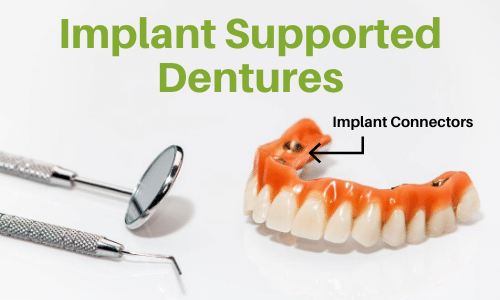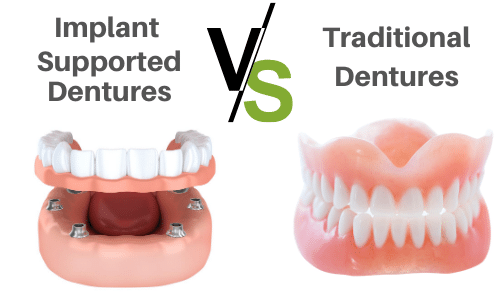Implant Supported Dentures: What You Need to Know
While tooth loss is not a normal part of healthy aging, many older adults will end up needing dentures. Good oral health, including having teeth or dentures to chew, is an important for getting the nutrition an aging body needs.
In the past we were limited to traditional “false teeth” that sit on the gum ridge, sometimes with adhesive. People may have full dentures or just an upper or lower denture. They can also have a partial denture that attaches to existing teeth.
One of the problems with traditional dentures if that they require a good ridge (the gums) to sit on. Some people experience bone loss in the jaw which can make it more difficult to maintain a good fit for their dentures. Without a good fit, it can be challenging to chew.
Newer technologies have opened up the door to even better denture opportunities.
Implant Supported Dentures
 Implant supported dentures are false teeth that sit on implants that have been drilled and placed into the gum line.
Implant supported dentures are false teeth that sit on implants that have been drilled and placed into the gum line.
There are typically several implants placed on the top and on the bottom jaw line (sometime 8 or more total in the mouth).
Implant supported dentures are meant to provide a permanent denture solution or those missing all for some of their teeth.
Dental Implants
Dental implants are meant to replace a natural tooth which has a root to keep the tooth in place. The implants are titanium posts that have been placed into the gumline during a series of surgeries. As the bone heals from being drilled, it grows around the implant, securing it in place (1).
This whole process is lengthy but is pretty amazing. The implant won’t decay like natural teeth (1). It’s a great benefit for those missing a single tooth or need to have implant supported dentures placed.
Implant Supported Dentures vs. Traditional Dentures
 Studies have found that many people prefer implant supported dentures over traditional dentures.
Studies have found that many people prefer implant supported dentures over traditional dentures.
Implant supported denture wearers reported greater satisfaction, better chewing ability, improved speech, better cleaning ability, comfort, aesthetics, and stability (2).
Traditional dentures are not made to last forever. The fit can change over time and they can become loose or uncomfortable.
This table summarizes some of the differences. Additional information is discussed further in the article.
Comparison: Implant Supported Dentures vs. Traditional Dentures
| Implant Supported Dentures | Traditional Dentures | |
| Satisfaction | Higher rates of satisfaction | Less satisfaction |
| Total Price | Very expensive | Expensive, but more affordable |
| Bite Force | 300% stronger bite force than traditional dentures | Only 1/5 to 1/4 bite strength of natural teeth |
| Process | Much longer process and requires surgery | Quicker to make, no surgery needed |
Why Choose Implant Supported Dentures?
The decision to choose this type of denture is usually a personal one. Maybe years of frustration with traditional dentures is leading someone to find a better option. Maybe they are looking for a more permanent denture option that stays in the mouth.
Whatever the reason, it is always important to do your research and determine the pros and cons.
The Pros
The biggest “pro” of implant supported dentures: patient satisfaction. People report being more satisfied, being able to eat easier, speak clearer, and feel more confident (2-4). All of this leads to improvements in quality of life.
Implant supported dentures can also help to improve dietary intake, nutritional quality, and prevent unintended weight loss/malnutrition. Implant supported dentures can provide better denture retention and improved bite strength or bite force (meaning how well the teeth can chew food) (3).
Dentures are not the same as natural teeth. Traditional dentures have only one fifth to one fourth of the bite strength of those with natural teeth (5). Implant supported dentures can improve bite strength/force by up to 300% compared to traditional dentures (3).

The Cons
Two of the biggest cons would be the length of time it takes to get implant supported dentures and the cost. It’s not a matter of just getting dentures made and putting them in your mouth. You need surgery to place the implants and then need to give the jaw time to heal around the implants.
Dental care is expensive in general. Because implant supported dentures require additional equipment (the implants) and requires a longer process, it costs more money. You are paying for more office visits and equipment than with traditional dentures.
Also consider that this is a newer technology. Scientists are continuing to look for ways to improve implant supported dentures. Implants can fail. It’s not too common, but it happens ~0.6-1.3% of the time (3). There can be complications in surgery. The teeth in the denture can chip. And sometimes the whole process just fails (3).
Ready to Start
 After carefully considering the pros and cons you may decide that this is something you really are interested in.
After carefully considering the pros and cons you may decide that this is something you really are interested in.
If you decide implant supported dentures may be right for you or someone you care for, it’s time to get started!
It may be a good idea to check in with your primary care provider (doctor) to share your interest in getting implant supported dentures.
Next steps is to find somewhere to get evaluated and to figure out the finances.
Finding a Location
First you need to find a qualified dental specialist in your area who can do this procedure. Check with your dentist or denturist first for recommendations and referrals. Not every dental office offers this service.
If you do not currently have a dentist or denturist, that is OK. Just search online for local offices that complete this procedure (just Google “implant supported dentures near me”). You will be able to learn about the specific process that office follows, figure out the cost, and other important details.
You can also use the American Dental Association’s Find-a-Dentist website.
Implant Dentures Cost
 Dentures are expensive. Period. But so is the health consequences of poor nutrition and poor oral health.
Dentures are expensive. Period. But so is the health consequences of poor nutrition and poor oral health.
Many insurance companies will cover a small percentage of the cost of dentures, but this might not include implant supported dentures.
The cost of implant supported dentures out of pocket will vary based on the office and your individual needs.
Estimates for the price of a full set of implant supported dentures vary greatly. Implant dentures cost can range from $20,000 to $50,000+. Check with your local dental office for the exact price offered in your area.
The high cost is mostly related to the number of individual implants that need to be placed. Each implant is expensive on its own! Many offices charge between $2,000- $5,000 for a single implant. Be wary of places that offer low price implants. There may be hidden costs or the quality may be poor.
The Process
The process for getting implant supported dentures made, inserted, and usable can be lengthy. If someone still has some teeth in their mouth that need to be removed, this can add additional time to the process.
As individual denture practices vary, it’s best to touch base with a denturist in your community who specializes in implant supported dentures to learn the exact process.
Getting the Implants
 Usually an individual would have an initial visit with a dentist or denturist to see if they are a good candidate for implant supported dentures. X-rays and impressions of the mouth will be taken.
Usually an individual would have an initial visit with a dentist or denturist to see if they are a good candidate for implant supported dentures. X-rays and impressions of the mouth will be taken.
Additional work-up may be needed to determine if there is enough bone in the jaw to place the implants.
The next steps are the surgeries required to place the implants. It may take one or two surgeries months apart to complete this step.
Individuals with a poor jaw line may need a bone graft before the implant is placed. Rebuilding the jaw through bone grafting takes time. Usually several months.
Surgery is then needed to cut into the gum line, drill into the jaw and place the implant. Most people require 4 or more implants per denture (so if they are getting full dentures- 4 on top, 4 on bottom).
Because the bone will be growing around the implant, it takes months before the actual denture is ready to be placed. The whole process can be around 6 months, but this may vary. During this time the overdenture (the false teeth that go on top of the implants) is created.
The last step is to have the overdenture placed. You may have a bar placed across the implants that the overdenture goes on. Or you may have ball attachments on the implants that the dentures snap into.
Life After Dentures
As you can likely tell, this is not a fast or easy process. But it can have significant benefits. After you get the implant supported denture placed it is so important to continue to follow-up with your dentist (1).
There will be an adjustment period as you to get used to the implant supported dentures in your mouth, speaking, and eating. Throughout the process you may find soft or pureed foods can be easier to consume. Especially if there is pain in the mouth during times of healing.
Continue to brush your dentures and care for them as you would normal teeth. Having healthy gums and a healthy mouth is very important. Just because you don’t have natural teeth doesn’t mean you can forgo oral health care.
Dentures are not invincible. And like natural teeth, they can be damaged. So, use care when eating and cleaning your dentures.
Again, follow-up with your dentist or denturist!

Conclusion
This was a lot of information, but I hope it was helpful. Implant supported dentures can help seniors enjoy eating again and feel like they have normal teeth again. Because the process is lengthy and can be costly, this might not be for every senior.
Improvements and advancements in technology will likely continue to improve the selection and denture opportunities offered to seniors. Best of luck in finding the right choice for you or your loved one!
(Feel free to use this infographic; please link back to this post and give credit to The Geriatric Dietitian!)
References
- Dental Implant Surgery. Mayo Clinic website. https://www.mayoclinic.org/tests-procedures/dental-implant-surgery/about/pac-20384622?_ga=2.21207027.975797698.1596479538-414719357.1596133457. Updated January 29, 2019. Accessed August 2, 2020.
- Zembic A, Wismeijer D. Patient‐reported outcomes of maxillary implant‐supported overdentures compared with conventional dentures. Clinical oral implants research. 2014 Apr;25(4):441-50.
- Ülkü SZ, Kaya FA, Uysal E, Gulsun B. Clinical Evaluation of Complications in Implant-Supported Dentures: A 4-Year Retrospective Study. Medical Science Monitor: International Medical Journal of Experimental and Clinical Research. 2017;23:6137.
- Sivaramakrishnan G, Sridharan K. Comparison of implant supported mandibular overdentures and conventional dentures on quality of life: a systematic review and meta‐analysis of randomized controlled studies. Australian dental journal. 2016 Dec;61(4):482-8.
- Michael CG, Javid NS, Colaizzi FA, Gibbs CH. Biting strength and chewing forces in complete denture wearers. Journal of Prosthetic Dentistry. 1990 May 1;63(5):549-53.
